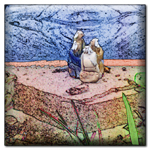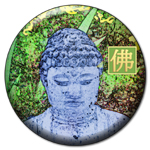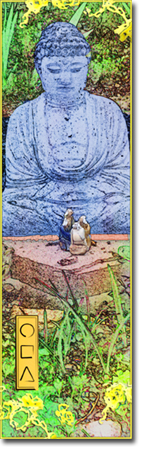On The Way: The Daily Zen Journal
Everyone Instantly Becomes a Buddha
Xu Yun (1839-1959)

Many Chan practitioners ask questions about the Dharma. The Dharma that is spoken is originally not the true Dharma. As soon as you try to explain things, the true meaning is lost. If you realize that this Mind is originally the Buddha, then at that very instant there is nothing more to do. Everything manifests its perfected state. All talk about practice or attainment is deception.
Bodhidharma’s “direct pointing at the Mind and seeing into one’s nature and thus attaining buddhahhood” clearly instructs that all sentient beings are buddhas. Once pure self-nature is recognized, you can harmonize with the environment yet remain undefiled. The Mind will remain unified throughout the day, whether walking, standing, sitting, or lying down.
This manifests the already perfected buddha. At this point there is no need to put forth effort and be diligent, let alone act in a certain way or be pretentious. Nor is there a need to bother with explanations or discursive thinking. Thus it is said that to become a buddha is the easiest, most natural task. Moreover, it is something you can control, without seeking help from outside.
All sentient beings in this vast land can instantly realize buddhahood if only they desire to avoid transmigration of four forms of birth and death and the six realms of existence in this long kalpa, tumbling in the sea of suffering without end.

Buddhahood can be attained if you desire the four virtues of nirvana (eternity, joy, self, purity) and wholly believe in the sincere words of the Buddha and the patriarchs, renounce everything and think neither of good nor bad. All buddhas, bodhisattvas, and patriarchs have vowed to exhaustively save all sentient beings; this vow is not a boast, nor is it groundless, making some sort of grand vow or empty remark.
The Dharma is exactly such. It has been elucidated again and again by the Buddha and the patriarchs. They have exhorted us with the truth and do not deceive us. Unfortunately, sentient beings are confused, and for limitless kalpas they have been wallowing in birth and death in the ocean of suffering, reborn here and reborn there, without any control of their endless transmigration. Confused with inverted views, they turn their backs on awakening and embrace the worldly dust of their senses, like pure gold in a cesspool.

Because of the severity of the problem and the degree of their defilement, the Buddha compassionately, without any choice, expounded eighty-four thousand Dharma doors to accord with the varying karmic roots of sentient beings, so that sentient beings may use these methods to cure themselves of eighty-four thousand habits and illnesses, which include greed, hatred, ignorance, and craving for affection.
Xu Yun (1839-1959)
Excerpted from Attaining the Way – A Guide to the Practice of Chan Buddhism – Sheng Yen 2006





The Dharma that is spoken is originally not the true Dharma. As soon as you try to explain things, the true meaning is lost.
Thus we have heard and read throughout our years of training. However, questions abound for many and don’t just disappear even after we “realize” the above. I have also heard “more practice” to stop the questioning mind in its tracks.
If you realize that this Mind is originally the Buddha, then at that very instant there is nothing more to do.
Well, yes, at that moment, but then there comes the cultivation part: the habit force, the conventions of culture, the many pulls from past experience cause us to drop the pearl of great price. And so begins the years of meditation and allowing the ego to gently lessen its grip so the truth can shine through us.
Buddhahood can be attained if you desire the four virtues of nirvana (eternity, joy, self, purity) and wholly believe in the sincere words of the Buddha and the patriarchs, renounce everything and think neither of good nor bad.
No matter who the teacher is we need to have a balance between what they say that is clearly delivered and what can tend to cloud things over a bit. To ascribe anything to nirvana is saying too much as it falls into “as soon as you try to explain things, the true meaning is lost.”
So, once again as we study the teachings we allow some things to wash through us without attaching to them. Most of the time the answers to some questions are not as important as the question itself before there is any answer.
Staying close to the question,
Elana, Scribe for Daily Zen